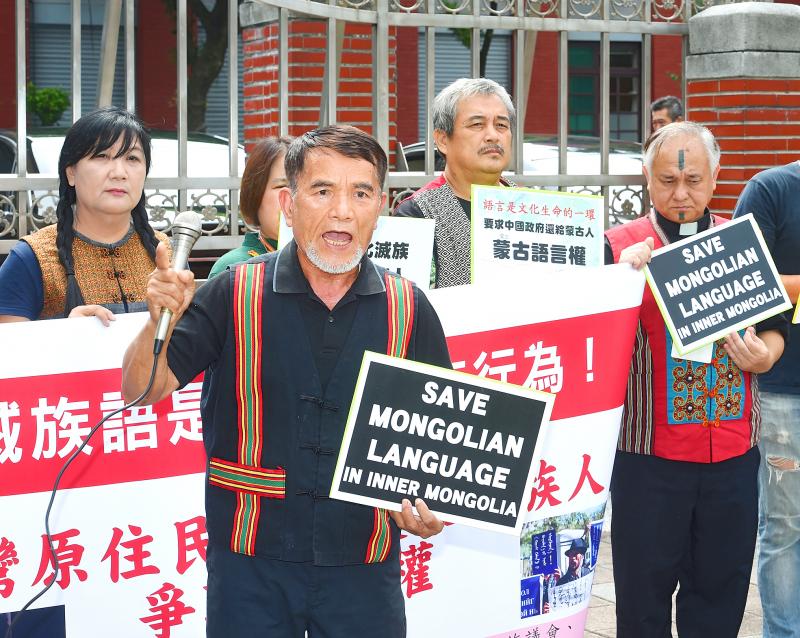Aboriginal groups yesterday voiced support for the people of Inner Mongolia, saying that China is to blame for protests because it is suppressing Mongolian language and culture in the region.
Chinese education officials in the region have barred classes in subjects other than the Mongolian language from being taught in anything but Chinese.
Students and teachers have decried the policy, with many not attending class in protest.

Photo: Fang Pin-chao, Taipei Times
At a rally outside the Legislative Yuan in Taipei, the Tayal National Assembly, the Indigenous Peoples’ Action Coalition of Taiwan, the Association for Taiwan Indigenous Peoples Policy and other organizations denounced what they called China’s policy of “cultural genocide.”
Rukai Legislator Saidai Tarovecahe of the Democratic Progressive Party told a news conference at the rally that mother tongues are the essence of knowledge of the natural environment, and for understanding life and the world.
“The fastest way to wipe out an ethnic group is to cut them off from their mother tongue,” she said.
“It is regretful that China’s authoritarian regime is adopting an assimilation policy against its ethnic minorities,” she said.
“A living Aboriginal language is like an identity card for us. If the language dies, then Aborigines would also die,” said former Council of Indigenous Peoples minister Yohani Isqaqavut, a Bunun, who is now a Presbyterian pastor and part of the church’s Taiwan Indigenous Ministry Committee.
“Aboriginal cultures, languages and traditions were suppressed” under the assimilation policies of the former Chinese Nationalist Party (KMT) regime, he said.
“It forced them to identify as Han Chinese ... so I can understand what the people of Inner Mongolia are going through right now,” he said.
“China has been promoting the use of Chinese while it is eradicating the mother tongue of ethnic minorities — which denies the basic rights of these people,” he said.
“We want to raise awareness of this issue and to protest against this shameful policy of the Chinese regime,” he said.
Independent Legislator Freddy Lim (林昶佐) said that people in China should have the same freedoms as Taiwanese.
“As a proud father of a three-year-old daughter, I want her to speak our mother tongue freely at kindergarten,” Lim said. “The actions of the Chinese government is to totally suppress the learning environment for Mongolian children, which will lead to the extermination of ethnic Mongolians in the region.”
“I urge countries around the world to support Inner Mongolia, and defend Mongolians’ right to their mother tongue,” he said.

A magnitude 5.6 earthquake struck off the coast of Yilan County at 12:37pm today, with clear shaking felt across much of northern Taiwan. There were no immediate reports of damage. The epicenter of the quake was 16.9km east-southeast of Yilan County Hall offshore at a depth of 66.8km, Central Weather Administration (CWA) data showed. The maximum intensity registered at a 4 in Yilan County’s Nanao Township (南澳) on Taiwan’s seven-tier scale. Other parts of Yilan, as well as certain areas of Hualien County, Taipei, New Taipei City, Taoyuan, Hsinchu County, Taichung and Miaoli County, recorded intensities of 3. Residents of Yilan County and Taipei received

Taiwan has secured another breakthrough in fruit exports, with jujubes, dragon fruit and lychees approved for shipment to the EU, the Ministry of Agriculture said yesterday. The Animal and Plant Health Inspection Agency on Thursday received formal notification of the approval from the EU, the ministry said, adding that the decision was expected to expand Taiwanese fruit producers’ access to high-end European markets. Taiwan exported 126 tonnes of lychees last year, valued at US$1.48 million, with Japan accounting for 102 tonnes. Other export destinations included New Zealand, Hong Kong, the US and Australia, ministry data showed. Jujube exports totaled 103 tonnes, valued at

BIG SPENDERS: Foreign investors bought the most Taiwan equities since 2005, signaling confidence that an AI boom would continue to benefit chipmakers Taiwan Semiconductor Manufacturing Co’s (TSMC, 台積電) market capitalization swelled to US$2 trillion for the first time following a 4.25 percent rally in its American depositary receipts (ADR) overnight, putting the world’s biggest contract chipmaker sixth on the list of the world’s biggest companies by market capitalization, just behind Amazon.com Inc. The site CompaniesMarketcap.com ranked TSMC ahead of Saudi Aramco and Meta Platforms Inc. The Taiwanese company’s ADRs on Tuesday surged to US$385.75 on the New York Stock Exchange, as strong demand for artificial intelligence (AI) applications led to chip supply constraints and boost revenue growth to record-breaking levels. Each TSMC ADR represents

TRUST: The KMT said it respected the US’ timing and considerations, and hoped it would continue to honor its commitments to helping Taiwan bolster its defenses and deterrence US President Donald Trump is delaying a multibillion-dollar arms sale to Taiwan to ensure his visit to Beijing is successful, a New York Times report said. The weapons sales package has stalled in the US Department of State, the report said, citing US officials it did not identify. The White House has told agencies not to push forward ahead of Trump’s meeting with Chinese President Xi Jinping (習近平), it said. The two last month held a phone call to discuss trade and geopolitical flashpoints ahead of the summit. Xi raised the Taiwan issue and urged the US to handle arms sales to